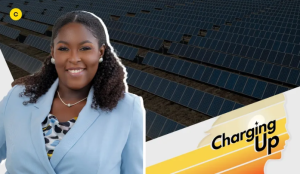22 May 2023

Charlin Bodley: A people-centric approach to clean energy
Charlin Bodley is a manager at RMI’s Energy Transition Academy. (Canary Media is an independent affiliate of RMI.) This interview has been edited and condensed for brevity.
How did you end up on this career path?
I studied environmental engineering in Mexico. Studying in a language that was not my first came with some challenges, but I was able to graduate at the top of my class. I went back home to St. Lucia, where I wanted to focus on issues affecting our environment in the Caribbean, like wastewater, but I had trouble finding a job right out of school. Fortunately, I was offered a job at my alma mater, an all-girls school, teaching chemistry and physics to high schoolers. I embraced an attitude of “bloom where you are planted,” and I loved imparting knowledge and empowering girls to pursue careers within the sciences.
After that, I spent four years working with the governor of St. Lucia in the position of energy, science and technology assistant. It was difficult as an engineer to accept a role as an assistant, but I was determined to get into that area of work, and sometimes you have to go back to go forward. I was lucky to be able to work on a number of sustainable energy projects, which solidified my interest in the energy world.
The Caribbean lacks affordable energy sources for electricity, and things like spikes in oil prices are felt very deeply here. So I was determined to work on building an energy system that is resilient. I pursued a master’s degree in energy engineering at the University of Flensburg in Germany, and when I returned home, I became a senior energy officer for the government of St. Lucia. I was also one of the first technical staff at the Caribbean Centre for Renewable Energy and Energy Efficiency, which was being set up as an implementation hub for sustainable energy in the Caribbean. Most recently, I joined RMI last year as a manager with the Energy Transition Academy.
What’s the best piece of advice you’ve ever received?
To push through and be authentic. That advice was given to me when I was working in a male-dominated field where your contributions are not always valued. I would be in meetings and I would be asked to take notes, just by virtue of being a woman, for example. It is hard to advocate for yourself, and it takes a lot of courage, but being authentic is key, and it is a piece of advice I have carried with me and have tried to give to more junior colleagues, too.
What is a barrier you faced, and how did you overcome it?
Gender has certainly been a barrier for me, which manifests both externally and internally. On the external front, there are different standards for men and women working within the sector, and possibly across the board. The technical knowledge and capabilities you can bring to a team may get questioned because you are a woman, and it is assumed you are not qualified. There are also very different standards when it comes to emotional intelligence and professionalism between men and women — men can express displeasure or anger in a way that women would never be able to because we are expected to behave a certain way. Internally, I think a lot of women deal with imposter syndrome. When you are entering a field and having your expertise be questioned constantly, that starts to weigh on your mind.
What do you think are some interesting, overlooked career opportunities in climatetech?
While there have been huge advancements in the technology of renewable energy and in climate financing, we now need to bring those two things together and focus on project development and implementation. We need to see kilowatt-hours connected to grids. We need to see microgrids up and running. We need to see communities being part of the process of diversifying energy supplies and energy mixes across the globe. The great thing is that when you do an energy project, there are ripple effects. You are empowering people by providing economic opportunities and development, and of course, you are empowering women.
What is your superpower?
Problem-solving and troubleshooting. There will always be problems and challenges along the way, and while it is easy to make an argument for why those are insurmountable, I am always really fired up to find ways around the problems and overcome barriers.
You have worked on gender issues throughout your career. How does your understanding of gender inform your work right now?
The energy transition is so people-centric that we cannot divorce the people who are affected disproportionately by climate change from the solutions that are being proposed. Research has shown that 80% of climate refugees will be women and children. And so, as we come up with solutions, it is our responsibility as professionals in the climate field to ensure that our services are meeting the needs of our end users. Understanding the needs of the end users also means understanding that they are disaggregated by gender, and so there needs to also be gender representation among those providing the solutions. If we continue to have a male-dominated workforce, we will miss out on the unique opportunity to have diverse solutions that truly meet the needs of the communities we are serving. It is also a matter of team performance. We know that diverse teams outperform non-diverse ones. Research has also shown that utility boards that are more gender-diverse enjoy higher profits than those that are less gender-diverse. So it’s certainly worth everybody’s time and effort and it will impact everybody positively if we do have a more gender-diverse workforce.
SOURCE: ![]()


